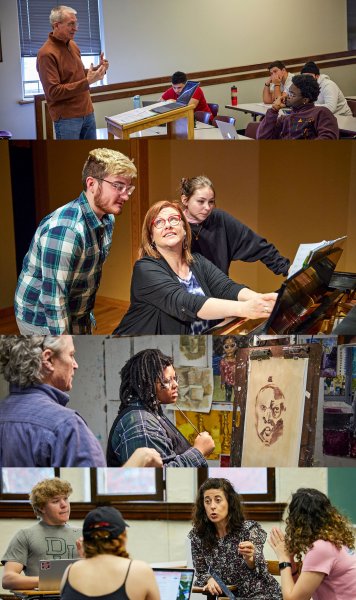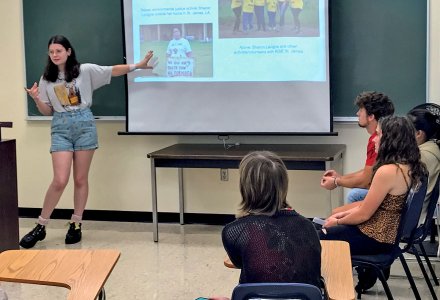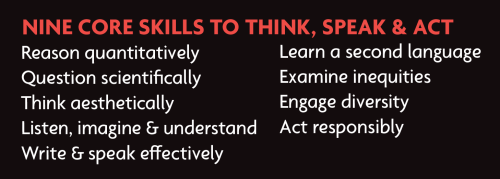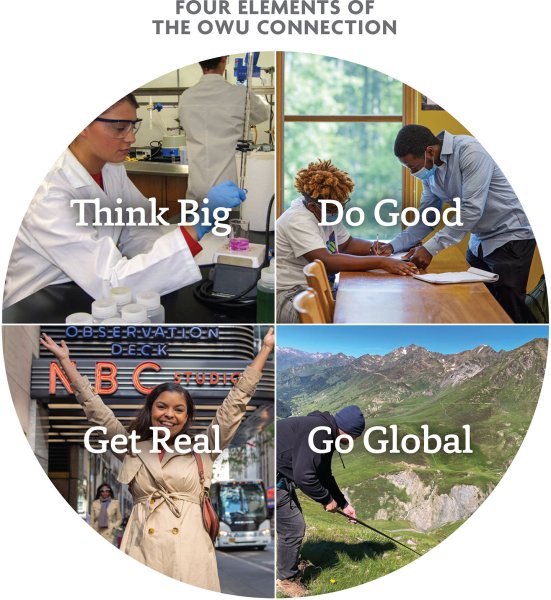Reimagined & Remade
Faculty Create a Liberal Arts Education for Today’s World

Study in the liberal arts is rooted deeply in the earliest universities, and it has evolved slowly over the centuries—seemingly much more slowly than the world around the proverbial ivory tower. Nevertheless, the world of 2022 needs liberally educated people more than ever.
We need people who can probe complex global problems, people who can develop insights and innovations across fields of study, people who can communicate with everyone everywhere, people with analytical skills who can separate truth from falsehood. Those are the traits best cultivated by study in the liberal arts.
But with today’s students growing up in an information technology revolution, and facing immense challenges globally and locally, the process of liberal education must adapt and change at the new speed of our world.
During the 2021-22 academic year, OWU faculty dove into that challenge. For the first time in 50 years, Ohio Wesleyan’s faculty have reimagined and recrafted the structure of the university’s general education curriculum and core academic program. OWU faculty have added, removed, and revised courses and majors continually over the years, but this marks the first major structural change in half a century, and it directly addresses the needs and concerns of today’s students while strengthening OWU’s historic commitment to the liberal arts.
Provost Karlyn Crowley calls the faculty’s work “a new dawning for transformational learning and curricular innovation at Ohio Wesleyan.” She adds, “The faculty Committee on Academic Planning took on this challenge, and the entire faculty worked tirelessly and fearlessly to create a bold and courageous curriculum for Ohio Wesleyan’s future. We will not be the same because of it.”
In the general education reform, faculty looked inside and outside academia—focusing on best practices for learning and on the skills that will help graduates succeed in their first job and throughout their careers.
The reimagined academic program is built on the framework of three components that will shape the educational experience of every Ohio Wesleyan student.
1. First-Year Seminar

Beginning in fall 2023, every incoming OWU student will take the interdisciplinary seminar “How to Change the World.”
With such an ambitious title, the full-credit course is designed to be the perfect introduction to thinking big, to embracing the power of the liberal arts, and to setting students’ ambitions on becoming leaders in the global society.
Each year, faculty will select a course theme that will focus on complex, widespread, intractable issues and “wicked problems” that connect liberal arts skills with real-world application. In a pilot version of the course this year, students are exploring the concept of global movement as it is embedded in issues such as trade, the spread of disease, and migration.
“The newly imagined first-year seminar allows students to see first-hand how their liberal arts education will allow them to tackle the challenges we face as a society,” says Ashley Biser, associate professor of politics and government and faculty director of the first-year seminar. “By focusing on skills like information literacy and critical reading, we’re helping students build a foundation for success at OWU, as well as providing them with transferable skills that will help them become active citizens and critical thinkers.”
She says seminar faculty also will help students imagine their pathways through the OWU curriculum so they can better understand why their college courses matter.
Full-time faculty from across the university will teach the course—all at the same time, on the same days. That will allow all first-year students to participate together in special events or hear guest speakers during that time.
“The faculty teaching the seminar are invigorated by the opportunity to learn from each other and work across disciplinary boundaries,” Biser says.
2. Skills, Not Checklists
The old-school liberal arts list of what students call the “gen eds” was a checklist based on academic divisions. Students were required to check off, say, three classes in natural sciences, three in humanities, one in the arts, and so on.
OWU faculty have discarded that model to focus on what students need: skills to think, speak, and act.
The reimagined academic requirements seek to help students build nine core competencies for meaningful work and life. These competencies, or skills, align with the traits that surveys show employers value most highly.
“These nine competencies are critical for being an informed and contributing democratic, global citizen—and to be successful in a career,” Crowley says. She says this new model will help students and families easily grasp the value of a liberal arts education and how their coursework translates to work in the world and skills for life.
 The goal outcomes for each class offered at OWU will align with developing one of these nine skills (shown in the graphic to the right).
The goal outcomes for each class offered at OWU will align with developing one of these nine skills (shown in the graphic to the right).
Zack Long, associate professor of English and associate dean of academic affairs, says the core competencies “communicate much more directly the relevance and applicability of the skills they’re designed to cultivate while also honoring the pedigrees of the knowledge that inform those skills. They’re practical but also intellectual.”
He adds, “I think the competencies also do a better job of telegraphing the values that lie behind them. Terms like ‘the humanities’ or ‘social sciences’ may or may not resonate with you, depending on your background. But when you hear that the purpose of a course is to cultivate your ability to ‘listen, imagine, and understand,’ then you immediately get the message.”
3. Hands-On Experience
For more than a decade, the OWU Connection has been Ohio Wesleyan’s signature program for experiential learning in and beyond the classroom. It has provided vast opportunities for students to experience mentored research, service learning, academic-related global travel, and internships.
For countless students, OWU Connection experiences have led to first jobs and impressive graduate school placements.
Beginning next academic year, the OWU Connection is embedded in the reimagined academic program, ensuring that every OWU student participates in experiential learning.
Dave Markwardt, professor of biological sciences and associate dean of the OWU Connection, says in order to satisfy this requirement, students will need to demonstrate how their experience is integrated into their own academic program.
“The OWU Connection has long provided students the opportunity to integrate, apply, and expand their work in the classroom in a wide range of other settings, on and off campus, at home and around the world,” Markwardt says. “With the Connection now established as a foundational part of the curriculum, all students will be guaranteed to benefit from all it has to offer.”
Every student also will be required to share their experience with the OWU community at the OWU Connection Conference, an all-day, student-centered event where students will discuss their own Connection experiences. Regular classes are canceled that day so the entire community can learn more about the impact and breadth of Connection opportunities.
One day each fall and spring semester will be set aside for an OWU Connection Conference. The inaugural conference was held October 6.
We know that hands-on experiences in undergraduate research, internships, study away, and service learning can have a deep impact on students and change them forever.
Ohio Wesleyan University Provost
 Crowley says the experiential learning from OWU Connection opportunities promotes “active engagement and deeper understanding” for students. “We know that hands-on experiences in undergraduate research, internships, study away, and service learning can have a deep impact on students and change them forever.”
Crowley says the experiential learning from OWU Connection opportunities promotes “active engagement and deeper understanding” for students. “We know that hands-on experiences in undergraduate research, internships, study away, and service learning can have a deep impact on students and change them forever.”
Crowley calls the passage of general education reform an historic moment for OWU. “The significance of this work cannot be understated. We will reap the rewards of this innovative curricular change for years to come,” she says. “Ohio Wesleyan will be transformed because of the story we can tell as the college of choice for a life-changing educational experience.”
Written by Will Kopp
